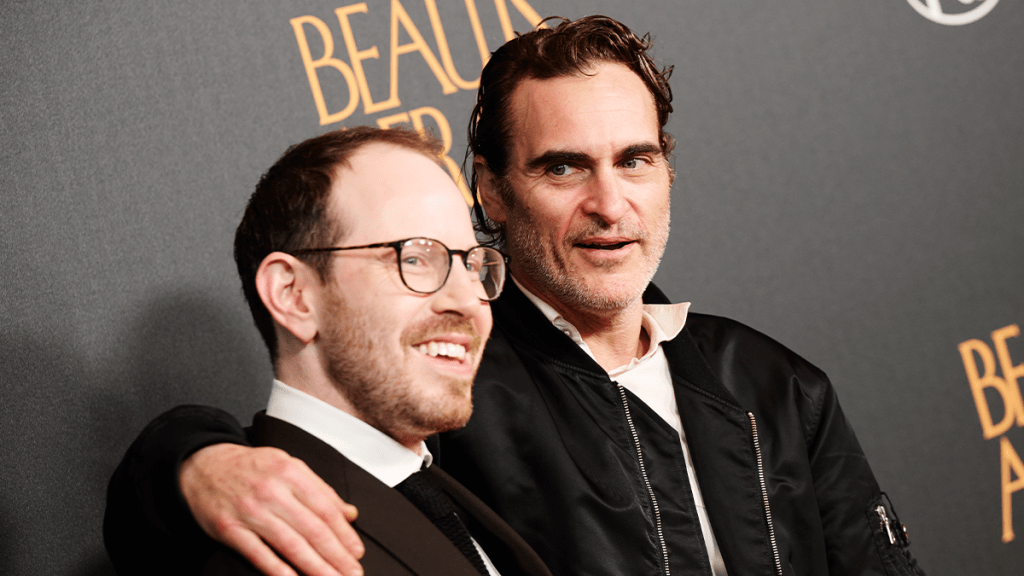Ari Aster’s newest surrealist tragicomedy horror film Beau is Afraid has arrived in theaters. ComingSoon spoke with writer/director Ari Aster (Hereditary, Midsommar) and star Joaquin Phoenix (Joker, Her, Gladiator) about the movie (watch and read more interviews).
“A paranoid man embarks on an epic odyssey to get home to his mother in this bold and ingeniously depraved new film from writer/director Ari Aster,” reads the film’s synopsis.
Jonathan Sim: Joaquin, your performance in this movie is nothing short of phenomenal. Are there any characters that you played in the past that you drew from while you were figuring out the character of Beau?
Joaquin Phoenix: No, certainly not consciously. No. Honestly, I think it was most difficult — it was pretty confounding, I think I really struggled in the beginning with “How does he accept what is happening in this world?” I think it’s so difficult because before we got into it and started to understand it, it would drive me crazy because I don’t get it. Why would you not comment on that? Why would you not say something? And it was really just trying to discover his nature and how much he accepts about this world and doesn’t question it.
So I think that was one of the most difficult things, and it felt like it was a few weeks in before I stopped asking those questions, and I stopped questioning the world and how he behaved. And I made all that up, but it will be good in print.
Ari, what was your writing process like for Beau is Afraid? How did it differ from some of the other scripts that you’ve written and how did you take the script that you wrote and adapt it to working with Joaquin?
Ari Aster: Well, the writing process is always kind of the same. You’re just feeling your way through something, and if something excites you for whatever reason, you just trust that, right? And I think writing just needs time because sometimes you can find the shape of something, and that means that a lot of scenes are essentially devices or bridges from one scene that you love to another scene and I think the challenge is, “How can I make sure that by the time we’re shooting, none of this scenes are just obligatory?” And, “We’ve got to do this in order to do that.”
I had the time with this one to do that for myself, to be able to read over it over and over again and kind of feel in my own body when I was just not in it, and it’s very hard to sometimes recognize that you’re not even liking something you’ve written because it’s so familiar that it just feels right. You’ve read it over a million times, it just is a fact. And so in the process of shooting the film, that never stops.
That feeling of, “As we come into this, let’s just be really hoping of what this can be and what it necessarily is,” and I don’t think the writing really changed in the shooting of the film. That’s not what changed. I mean, every now and then, Joaquin will say, “What the fuck am I saying? Because I don’t want to say this.” So I’ll say, “Well you don’t get to say anything,” and I’ll take the line away. It’s not the writing that changed.
Joaquin Phoenix: I mean, the only thing that comes to mind is there was like one scene with exposition which is like death to an actor. And we sat during lunch trying to figure out the scene, and my solution was, just cut out that section of the movie, and Ari was like, “I can’t do that.” And I was like “Well you don’t really need it, I mean it’s just a dad. Who cares?” We really struggled with it, and then just good fortune, we were shooting —
Ari Aster: Be vague about it. No spoilers, but go ahead.
Joaquin Phoenix: So we were shooting the other actors first. And in that process of being off-camera, it just suddenly occurred to me how I could interact and that I could get that dialogue out in a way that didn’t feel expositional and felt real. And I remember talking to [Ari] about it outside, and we weren’t sure, “Would it work?” And I got so embarrassed that when we did a couple takes, I didn’t try it. And then after a few takes, you were like, “Why aren’t you trying the thing?’ And I said, “I don’t know if it’ll work, I’m embarrassed.” And [Ari] said, “Just try it. Try it.” And I don’t know, it worked.
Ari Aster: I mean, it didn’t work. It’s like your best moment in the film. It was amazing. Thank God.
Joaquin Phoenix: Well, we sat down, and we labored it. We sat through lunch, and we talked about every possibility.
Ari Aster: And we were really hitting a wall at that point. And it was a wall that was there in prep too. Like we had identified that early on like we need this information, but how can this not be —
Joaquin Phoenix: And by the way, lunch is at midnight because it’s a night shoot. So you’re on a night shoot with the clock ticking, readying a sequence you don’t have time for, and you’re trying to figure out this moment that feels very important to the story and very important to the character, and that’s one of those high-stress moments that are so enjoyable. They’re miserable to go through, but it’s such an exhilarating experience.











